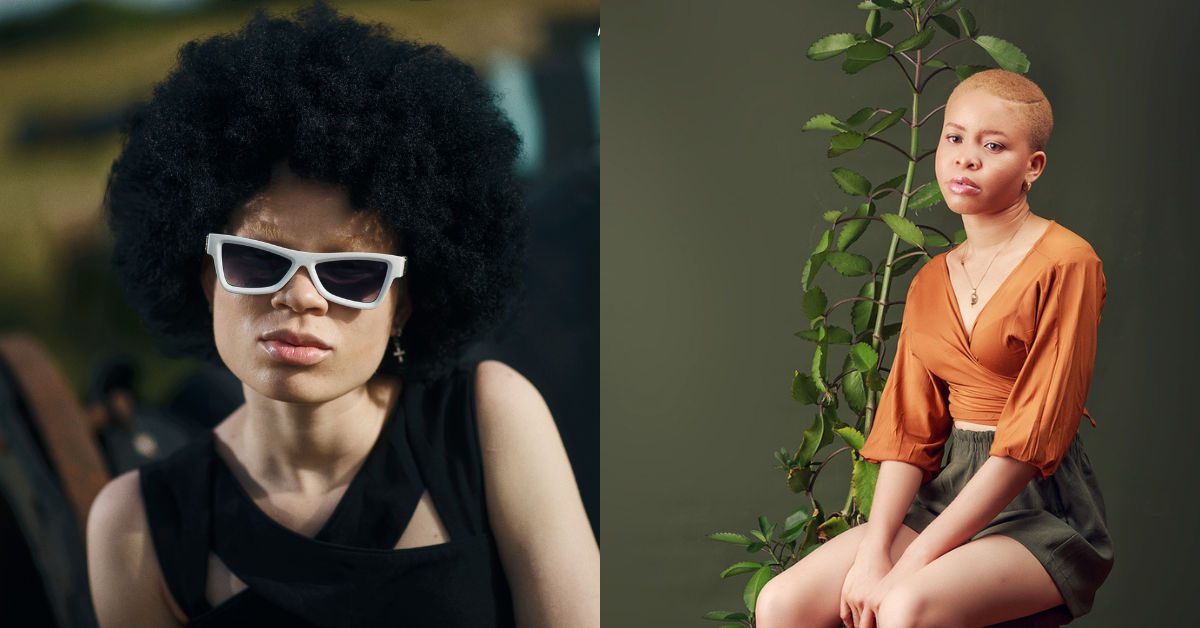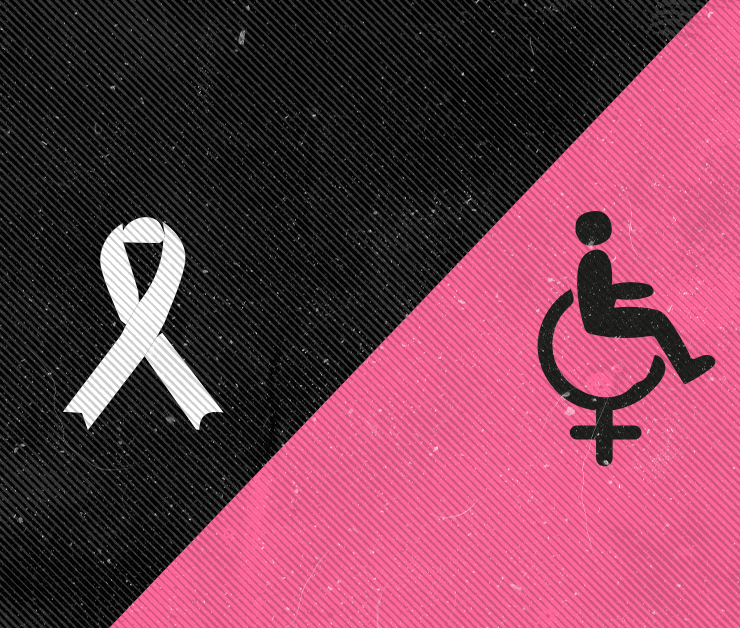These Nigerian content creators want to change perceptions about albinism
- Media content around albinism is ridden with various misconceptions and myths, and many of them are dangerous. Can these content creators change that?

Image description: A collage of two images. The first is Ayomide Matilda, a fashion content creator living with albinism. In this image from a shoot, she is dressed in black, with white sunglasses and her hair is an afro. She looks fiercely at the camera. The second image is Jessica Hyacinth, a content creator also living with albinism. She is sitting on a stool posting for the picture. Her hair is tinted blond and is a low cut. She is wearing an orange wrap blouse and what appears to be a green skirt. There is a plant behind her and just in front of the green backdrop.
Lagos, Nigeria (Minority Africa) — As a child, Jessica Hyacinth, who lives with albinism, was frequently scrutinised and dehumanised.
“I went to the market with my mum one day and children followed us singing oyibo pepper, adults were asking if I could see and arguing among themselves that I was actually a doll and not a real person,” Hyacinth recalls.
The experience, one of many others, spurred the Nigerian content creator to begin to make educational content about albinism.
“The biggest challenge is that people don’t have the right knowledge about the condition. If they all knew better, life would definitely be easier,” Hyacinth says about the necessity of her voice and platform.
She shares a story. “I was in a bus one day riding to Lekki Phase 1 and some people got off; then a person with albinism was about to enter the bus and occupy [one of] the empty seats when the driver yelled at him to get off that he doesn’t carry Afins [a Yoruba word meaning White Skin].
“I froze where I sat in the last row. I was so sad and felt guilty that I couldn’t do or say anything. So I just sat there and cried.”

Most statistics on the number of persons with albinism in Nigeria estimate it to be between two to four million and a 2014 study found that 41% of persons with albinism exhibit mental health issues related to being a person with albinism.
It is a similar situation across the continent where persons with albinism suffer from discrimination spurred by certain myths and misconceptions. There are widespread beliefs that albinism results from mystical forces, whether God, the devil or witchcraft. Some of the superstitions are benign; others have proven more dangerous.
In Tanzania, witch doctors have spread the myth that individuals with albinism and their body parts have superpowers. For example, anglers use nets woven from albino hair, believing these nets will catch more fish.
Witch doctors use body parts from persons with albinism as ingredients in potions or as a trinket for jewellery to bring good fortune and wealth to those who possess them. Victims are kidnapped and then dismembered by hired killers or even sold by unscrupulous family members, with body parts fetching up to $75,000. These myths create a culture of violence aimed at people with albinism.
Ayomide Matilda, a fashion content creator and model living with albinism who advocates against discrimination targeted at people with albinism, finds the myths to be absurd.
“[Many people] assume things and feel that our presence would evoke strange things,” she says. “We get treated differently since people aren’t ready to change their narrative of us.”
For this reason, Matilda founded Beyond Colours, a platform wielding content creation as a tool to combat albinism discrimination.
“The media has been playing a huge role in publicity lately but I feel it is doing less of what I’d love to see,” Matilda says. “Albinism awareness is one of the major reasons I ventured into content creation and I’ll never shy away from it.”
It is the hope of creators like Matilda and Hyacinth that their content can dispel particular misconceptions. One of such is that people with albinism go blind. Hyacinth describes how strangers would ask if she could see them.
“Having random people ask me if I could see them and mockingly wave in my face as if to fact check is humiliating,” she says.
Another particularly damaging misconception is that albinism is due to a lack of sun and so persons with albinism are encouraged to work outdoors as frequently as possible, they say, further increasing their risk of skin cancer. The contrary is in actuality the case.
“As an albino model, I struggle with the timing of my outdoor shoots on certain days as I can’t be out in the sun for long periods,” says Matilda.

While content creators like Hyacinth and Matilda are working tirelessly to change the perceptions of people with albinism in Nigeria and the wider African continent, it is a task that will need broader collaboration from mainstream media.
For instance, one of Hyacinth’s biggest concerns is how people with albinism are presented in films. She explains that they are portrayed as villains in many Hollywood films and that these casting decisions negatively affect stereotypes of albinism.
What is the solution? To Hyacinth, a shift in storytelling can play an influential role in changing negative narratives.
“We want to see people with albinism cast in many different roles, not just villain roles,” she says.
Similarly, while Matilda admits some progress in media representation of albinism, she still sees room for improvement in the diversity of said representation. “There is a lot of segregation on sets between people with albinism and people without,” she says.
Nevertheless, the subject of adequate representation for people with albinism has long been contentious, even among persons living with albinism themselves. Ameen Olatunji Yusuf popularly known as “Teejay Ameen”, a Nigerian entertainment executive, thinks that positions should be given on merit.
“When I hear of representation, I’m thinking handouts. It’s disheartening that some people believe that they’re owed a chance because of their condition,” he says.
Ameen’s standpoint is that people with albinism need to use their skills and talents to create their own spaces to thrive. Yet for Hyacinth, she hopes that her presence and representation can allow future generations of persons living with albinism not to be exposed to the same discrimination she experienced as a child.
“I worked extra hard to do everything that every other child was doing because I didn’t want people to say, ‘She’s not doing it because she has albinism.’ So I felt inclined to prove that I was normal,” she says.
Ameen has a contrary experience.
“Never for once in my life have I felt different,” he says, explaining that his parents treated him like they did his siblings and he took on equal tasks as them with no special treatment.
In later years when he “discovered albinism to be a thing,” Ameen says he had already established confidence in himself so the discrimination didn’t bother him.
“Whatever people said thereon, I didn’t see it as discrimination. I’ve never seen myself as different. I’m still a black man,” says Ameen.
And feeling a difference or lack thereof for a condition should not be conflated with feeling limited by it. As Hyacinth puts it, “I always say that it’s nothing more than a lack of melanin in my eyes, skin and hair. I have big dreams and I don’t see my condition as a hindrance to them.”
‘’There’s no shame in understanding how things would work differently for me,” Ameen says about navigating living with albinism in his community. “I increase the size of text on my phone to make up for my shortsightedness. You have to learn that this is how things are and adjust accordingly.’’
Although Matilda, Hyacinth, and Ameen don’t believe they can completely change the narrative, they hope to nudge it in a better direction. For example, through her work, Matilda aspires to empower people with albinism to live their lives authentically without fear.
“My life is beyond my skin colour. I know and accept this and I’m winning everyday,” she says.
And Ameen believes, “You cannot control what people think but you can influence the narrative. Silence the noise and listen to yourself, listen to your heart and discover yourself. Discover your purpose and that’s enough motivation to keep on doing whatever you’re doing.”
Edited by Cassandra Roxburgh, Caleb Okereke, and Uzoma Ihejirika.
Edisana Stephen is a Nigerian writer voicing minority issues and mental health as relating to Africans.






